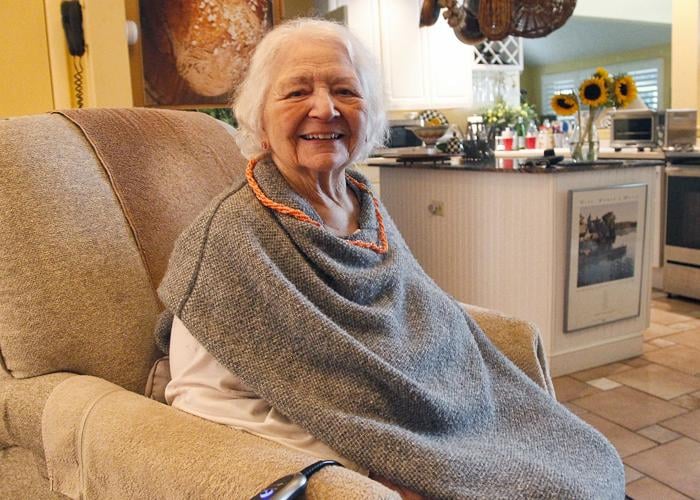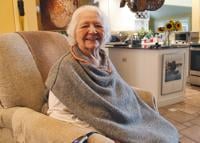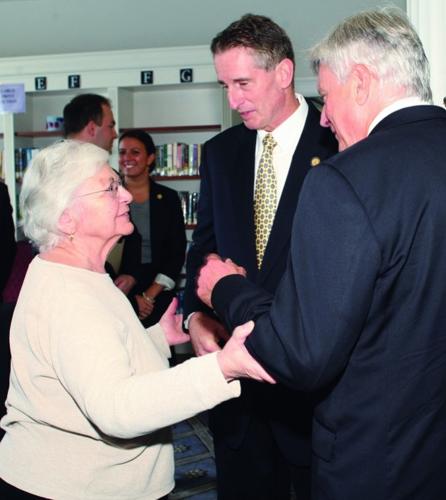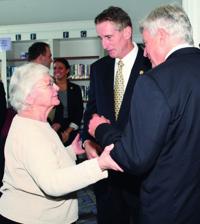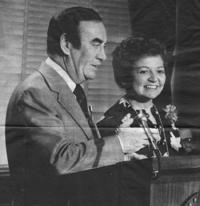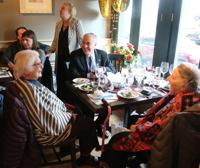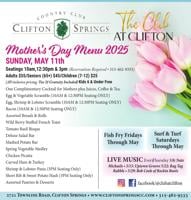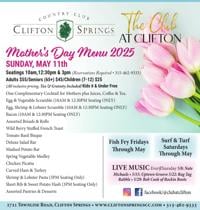GENEVA — The most important thing about former Lt. Gov. Mary Anne Krupsak’s career in government wasn’t so much the ground she broke, but the ground that was gained by her uncanny ability to set partisan politics aside.
“She found common ground working for the common good,” state Comptroller Thomas DiNapoli said during Krupsak’s funeral Mass at St. Francis DeSales Church Monday. New York’s first woman ever elected to the state’s second-highest office, Krupsak died on Dec. 28 at her home on Seneca Lake. She was 92.
The 90-minute funeral was conducted by the Rev. Thomas Mull. Current New York Lt. Gov. Antonio Delgado attended but did not speak. Mull said that Krupsak had chosen the readings for the service, which included a chapter from the Book of Maccabees where Judas takes back Jerusalem.
It was evidence of Krupsak’s desire, as Mull noted, to have things work her way. He joked that she was probably “discussing some changes” with God already.
A lifelong Democrat whose health had been failing for several months, Krupsak had asked fellow Democrat DiNapoli to speak when it came time for her funeral. And she asked former Republican state Sen. Michael Nozzolio, whom she too considered a cherished friend for more than a quarter-century, to say a few words as well.
Both men, who sat together at the funeral, said Krupsak didn’t care what side of the political aisle her allies came from when she wanted to get something accomplished, and she didn’t mind who knew it.
That included former First Lady Hilary Clinton, who had threatened not to attend when she heard that Nozzolio and then-Republican Gov. George Pataki, had been invited to speak at the 150th anniversary of the Women’s Rights convention in Seneca Falls in June of 1998.
Retelling the now oft-repeated story, Nozzolio noted that he had helped Krupsak, the event’s main organizer, secure hard-to-find dollars to put on Celebrate 98 that brought nearly 15,000 people to the area to honor the likes of Elizabeth Cady Stanton, Susan B. Anthony and Amelia Bloomer.
“She sought me out,” Nozzolio said of Krupsak, who knew, as a Seneca Falls native, he valued its ties to women’s empowerment. “We were getting along great, because I was smart enough to do everything she asked me to do ... then there was a last-minute hiccup.”
After the programs had been printed, and the signs, 48 hours before the event, Clinton’s staff conveyed to Krupsak the First Lady objected to being on the stage with two Republicans.
“Without skipping a beat, Mary Anne said it would be a shame if the First Lady missed the event, but maybe they would invite her next time,” Nozzolio said. Clinton did attend but left quickly after she spoke. Meanwhile Nozzolio and Krupsak went to another event on the Erie Canal, had lunch and “had a great time.
“She had your back, no matter your politics,” he said. “She took to the task at hand, rather than play party politics.”
DiNapoli recalled being a 20-year-old college student in 1974 and calling Krupsak late one night at her home (he said he didn’t know her campaign phone was also her personal phone) to volunteer to help her in her bid to become the state’s first female lieutenant governor.
“It was the first time I got involved in state politics,” he said. “And you know, (now-Gov.) Kathy Hochul was also a volunteer on that campaign.”
DiNapoli remembered Krupsak’s campaign slogan: “She’s not just one of the boys.” It was a new take on politics — it motivated many young people who felt left out, he said.
Nozzolio said that Krupsak wasn’t just a trailblazer for women’s issues and bipartisanship. She also was instrumental in helping to establish the Finger Lakes as one of the state’s premier wine regions. Alongside her friend Dr. Konstantin Frank, her committed efforts played a significant role in the development of the Finger Lakes wine industry as we know it today.
Krupsak was responsible for pushing for the Farm Winery Act in 1976, which started the tremendous presence of New York’s now more than 400 wineries —with a third of them in the Finger Lakes. It was a major contribution to agriculture and agritourism in the state, he said.
“It’s important, I think, to remind people of at least one legislative success because of her work,” said Carol Doolittle, co-owner of Frontenac Point Vineyard & Estate Winery on Cayuga Lake. “The Farm Winery law revitalized rural NY — from Long Island throughout upstate.”
She added that “her town meetings throughout the state to gather information from the (only 19) wineries then, the liquor store owners (you should have heard their objections!), grape growers and others were thorough and gave her the information to convince enough legislators, then, to pass the bill. There was a lot of opposition to it — if you can believe that.”
Krupsak’s support of the “I Love NY” program during her term as lieutenant governor made the program what it has grown into today, Nozzolio noted. He said that Krupsak made both upstate and downstate among the most visited tourist destinations in the world.
He also expressed his condolences to Krupsak’s “partner and dearest friend,” Sue Cohen and her family. Cohen’s son, Josh, also spoke during the service.
He remembered going to Krupsak’s home in Menands, outside Albany, as a child, and seeing a big E on the wall. He asked her why it was there and she said that everyone was always forgetting the E at the end of Anne, so she put it up.
“None of us ever forgot that e, ever,” he said.
He knew that Krupsak, who he called his aunt, was important because whenever she came to their house, she came in a limo. He also said a teacher who was not so nice to him had a complete change of heart when he found out that he was related to Krupsak.
“He had no idea,” Cohen said. “That’s your aunt? And she helps you with your homework?”
Krupsak was born on March 26, 1932 in Schenectady, N.Y. to Ambrose and Mamie Krupsak. Raised in Amsterdam, Montgomery County, Krupsak earned her bachelor’s degree in history from the University of Rochester in 1953, before receiving her masters degree in public communication from Boston University in 1955. Prior to graduating from University of Chicago Law School in 1962, she served as a public information officer at the New York State Department of Commerce, and later as a staff member of New York Gov. W. Averell Harriman.
She was a member of the New York State Assembly from 1969-73, and the New York State Senate from 1973-75, and soundly defeated Mario Cuomo in the Democratic primary of 1974, prior to making history as the first woman ever to be nominated and elected lieutenant governor of New York in November of that year.
As lieutenant governor under Hugh Carey, she heeded his request not to run for a second term because he wanted Cuomo in that seat. Instead, Nozzolio said, she chose to run for governor herself — the first woman to seek that seat — but the political odds were against her.
Still, she made significant inroads for the state.
In 1978 Krupsak successfully fought to save Radio City Music Hall from demolition, and instead ensured that the iconic theater be preserved as a National Landmark as it remains today.
In life after politics, Krupsak became senior partner at the law firm Krupsak & Mahoney, and a senior partner and co-founder of Krupsak, Wass de Czege & Associates, an economic development firm.
She and Cohen also owned and ran several eateries in the Geneva area over the years, including the Cobblestone and City Eatery, before retiring to their home on East Lake Road in Fayette.
Krupsak was buried in Fort Hill Cemetery in Auburn.

